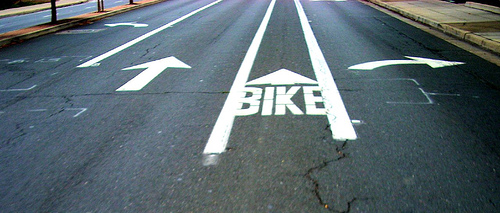
Photo by richardmasoner, <a href="http://www.flickr.com/photos/bike/897803699/">via Flickr</a>.
I expend a lot of pixels blogging about climate and energy legislation here in Washington, and just how much (or how little) our lawmakers will commit to cutting planet-warming greenhouse gas emissions. But are we overlooking some of the most immediate solutions to the problem–simple behavior changes that any of us can start making right now?
Tiny changes can yield a 15 percent reduction in US greenhouse gas reductions by 2020, cutting 1 billion tons of CO2 from the atmosphere, according to a new study released by the Natural Resources Defense Council and the Climate Mind Behavior Project at the Garrison Institute on Friday.
The changes they propose aren’t major, and a lot of them would save money, too. If Americans who fly more than three times a year were to cut out one flight each, the US could cut emissions by 125 million tons. Five percent of fuel use in the US is used while idling, so if we all simply turn off the car off while talking to the neighbor, we could cut emissions 40 million tons of carbon. We could also reshape our food habits, by subbing in poultry for red meat a few days a week. Reducing the amount of food we throw away each year by 25 percent reduction would reduce emissions 65 million tons.
Not that these should come in lieu of national action to cut emissions from big polluters like coal-fired power plants and refineries, says Peter Lehner, executive director of the Natural Resources Defense Council. These are just things we could be doing while Congress hashes out much-needed policy reforms. “We realized it could make a difference, and we shouldn’t ignore that,” said Lehner. “These are things that could happen virtually immediately.”
Some other things the report suggests we could be doing: canceling those catalog subscriptions we don’t actually want, using a programmable thermostat, putting our computers to sleep, and, of course, switching out old light bulbs for compact fluorescents.
The report doesn’t, however, offer any suggestions about methods of encouraging widespread adoption of these habits. That’s the next phase of their work. The groups held a symposium in New York this week with behavioral economists, social psychologists, and environmental advocates to discuss ways to encourage better individual choices and behavior shifts. I’d guess that a lot of people are at least vaguely aware that they should be doing these things; the problem is, most of us don’t. The question of how best to encourage those practices is probably the most interesting.
I maintain that action at the state, federal, and international level to reduce emissions is by far the most important factor in curbing global warming. But Lehner argues that getting people to do the little things can help encourage them to become more involved in pushing their leaders to do the heavy lifting. “Good deeds foster other good deeds; momentum matters,” he said. “For people to understand that personal action can make a big difference, leads to political action. You start biking to work, you start being active about getting bike lanes. All of these things start making sense to you–policy ideas are no longer abstract.”










